|
|
|
Sort Order |
|
|
|
Items / Page
|
|
|
|
|
|
|
| Srl | Item |
| 1 |
ID:
149744
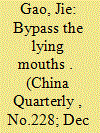

|
|
|
|
|
| Summary/Abstract |
The deliberate distortion of the work accomplishments of local governments is a growing concern for China's leaders in the reform era. How do they tackle this problem and gather reliable data? This study argues that the CCP has developed bypassing strategies to remedy the deficiencies of the statistical system which is vulnerable to artificial data distortion. By employing these strategies, authorities requiring authentic information can directly access the raw data, thereby bypassing lower-level officials who have incentives to distort performance information in the level-by-level reporting process. This study shows that the adoption of bypassing strategies enhances the capacity of the party-state to gather local intelligence. Although the strategies are limited in their ability to ensure the quality of certain types of data, their use should improve the quality of key information on the performance of local governments in the long term.
|
|
|
|
|
|
|
|
|
|
|
|
|
|
|
|
| 2 |
ID:
149742
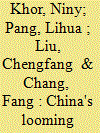

|
|
|
|
|
| Summary/Abstract |
Accumulation of human capital is indispensable to spur economic growth. If students fail to acquire needed skills, not only will they have a hard time finding high-wage employment in the future but the development of the economies in which they work may also stagnate owing to a shortage of human capital. The overall goal of this study is to try to understand if China is ready in terms of the education of its labour force to progress from middle-income to high-income country status. To achieve this goal, we seek to understand the share of the labour force that has attained at least some upper secondary schooling (upper secondary attainment) and to benchmark these educational attainment rates against the rates of the labour forces in other countries (e.g. high-income/OECD countries; a subset of G20 middle-income/BRICS countries). Using the sixth population census data, we are able to show that China's human capital is shockingly poor. In 2010, only 24 per cent of China's entire labour force (individuals aged 25–64) had ever attended upper secondary school. This rate is less than one-third of the average upper secondary attainment rate in OECD countries. China's overall upper secondary attainment rate and the attainment rate of its youngest workers (aged 25–34) is also the lowest of all the BRICS countries (with the exception of India for which data were not available). Our analysis also demonstrates that the statistics on upper secondary education reported by the Ministry of Education (MoE) are overestimated. In the paper, we document when MoE and census-based statistics diverge, and raise three possible policy-based reasons why officials may have begun to have an incentive to misreport in the mid-2000s.
|
|
|
|
|
|
|
|
|
|
|
|
|
|
|
|
| 3 |
ID:
149748
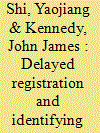

|
|
|
|
|
| Summary/Abstract |
In 2010, according to the sixth Chinese census, the sex ratio at birth (SRB) was 118 males for every 100 females. The global SRB average is about 105. Thus, the gap between 118 and 105 is made up of “missing girls.” Scholars present three main explanations for the skewed SRB statistic: sex-selective abortion, infanticide and delayed or late registration. Most studies take a demographic and cultural approach to explain the high SRB. However, we believe the story of the “missing girls” is also an administrative one and adopt the street-level bureaucrat theory of policy implementation to explain the pervasiveness of late registration in rural China. We use descriptive statistics derived from the 1990, 2000 and 2010 census data to identify the “missing girls.” We believe the combination of late registration and unreported births may point to a larger proportion of “missing girls” than previously reported from the SRB statistic.
|
|
|
|
|
|
|
|
|
|
|
|
|
|
|
|
| 4 |
ID:
149743
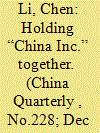

|
|
|
|
|
| Summary/Abstract |
This article investigates the role of the Chinese Communist Party (CCP) in the rise of China's centrally controlled businesses (yangqi 央企), a batch of large business groups and financial institutions controlled by China's central party-state. It starts by comparing two competing policy approaches to defining the relations between the Party and state enterprise sector: the separation approach versus the adaptation approach. It then examines how the Party's “pro-big business” policies have shaped China's large enterprise reform since the 1960s and led to the formation of the yangqi. It also describes the key mechanisms used by the CCP to control the yangqi, including its personnel management system and disciplinary force. It further identifies and summarizes three key modes of the Party's intervention in the rise of the yangqi: institutional and policy entrepreneurship; leveraged personnel control; and residual mobilization capacity. The article concludes by discussing the future prospects for reforming the relations between the Party and big business in China.
|
|
|
|
|
|
|
|
|
|
|
|
|
|
|
|
| 5 |
ID:
149754
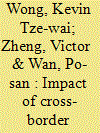

|
|
|
|
|
| Summary/Abstract |
Using official statistics and a pooled dataset of longitudinal surveys, the aim of this article is to examine the impact of the Individual Visit Scheme (IVS) on political trust in Hong Kong. Our multilevel analysis found that the gradual inflow of IVS visitors (mostly overnight visitors) increased political trust in the first few years, but that this trust rapidly diminished in later years, especially after the introduction of the one-year multiple-entry IVS endorsement (which attracted mostly same-day visitors). The main reason for the reduction in the positive impact of the IVS scheme is that the growth in the number of same-day visitors has contributed less to Hong Kong's economy than has the increase in the number of overnight visitors, and has exacerbated several social problems. The impact of mainland visitors has varied across groups with different levels of education. The political trust of people with a senior secondary education has been enhanced more by the increase in overnight visitors and reduced less by the increase in same-day visitors than that of people with a tertiary level of education or a junior secondary education or below.
|
|
|
|
|
|
|
|
|
|
|
|
|
|
|
|
| 6 |
ID:
149745
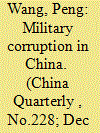

|
|
|
|
|
| Summary/Abstract |
How does guanxi facilitate corrupt transactions? Utilizing fieldwork data and published materials, this paper investigates how guanxi practices distort the formal military promotion system and facilitate the buying and selling of military positions in the People's Liberation Army (PLA). It identifies the three key functions of guanxi in facilitating corrupt transactions: communication, exchange and neutralization. Guanxi enables effective and safe communication among corrupt military officers, holds transaction partners to their word, and neutralizes their guilt about committing corrupt acts.
|
|
|
|
|
|
|
|
|
|
|
|
|
|
|
|
| 7 |
ID:
149751


|
|
|
|
|
| Summary/Abstract |
Under Xi Jinping's administration, ideological control in China has been tightened and political dissent has become increasingly difficult, especially in universities. What can professors do? Our research in one university in central China finds that professors have multifaceted identities and engage in synchronous political roles as establishment/organic, non-establishment/professional and contra-establishment/critical intellectuals, although most take on the first two roles. Our research is based on 36 interviews with professors, students and administrators from various departments of this provincial university and on an analysis of the faculty's teaching and research. This paper aims to contribute to the sociology of intellectuals and higher education by illuminating how professors, as intellectuals, engage in contemporary Chinese political discourse.
|
|
|
|
|
|
|
|
|
|
|
|
|
|
|
|
| 8 |
ID:
149740


|
|
|
|
|
| Summary/Abstract |
Why do authoritarian regimes try to improve the quality of their governance? In the absence of democratic institutions to monitor, reward and punish their performance, authoritarian politicians are normally expected to seek their self-interest through corruption and rewards to cronies, rather than providing for the public welfare. However, the Chinese state has actively promoted improved governance in recent years, with greater attention to quality of life issues to balance the primary focus on sustaining rapid economic growth. This paper analyses intra-national variation in the provision of public goods in urban China and the impact of public goods on regime support. Does better governance lead to higher levels of public support for the regime, even in the absence of democratic elections? Our evidence suggests that it does, with a greater impact for the local level than for the centre.
|
|
|
|
|
|
|
|
|
|
|
|
|
|
|
|
| 9 |
ID:
149746


|
|
|
|
|
| Summary/Abstract |
The “Singapore model” constitutes only the second explicit attempt by the Chinese Communist Party (CCP) to learn from a foreign country following Mao Zedong's pledge to contour “China's tomorrow” on the Soviet Union experience during the early 1950s. This paper critically evaluates policy transfers from Singapore to China in the post-Mao era. It re-examines how this Sino-Singaporean regulatory engagement came about historically following Deng Xiaoping's visit to Singapore in 1978, and offers a careful re-reading of the degree to which actual policy borrowing by China could transcend different state ideologies, abstract ideas and subjective attitudes. Particular focus is placed on the effects of CCP cadre training in Singaporean universities and policy mutation within two government-to-government projects, namely the Suzhou Industrial Park and the Tianjin Eco-City. The paper concludes that the “Singapore model,” as applied in post-Mao China, casts institutional reforms as an open-ended process of policy experimentation and adaptation that is fraught with tension and resistance.
|
|
|
|
|
|
|
|
|
|
|
|
|
|
|
|
| 10 |
ID:
149752
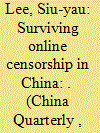

|
|
|
|
|
| Summary/Abstract |
What accounts for online satirical campaigns that survive censorship in China where the state has formidable power to censor and manipulate online communication? Through comparative case studies of three attempts to challenge the policies or malpractices of the Chinese state in 2009, this article explains how different satirical tactics can influence the outcomes of online activism. It argues that online satirical campaigns are most likely to survive when activists adopt the tactic of “parodic satire,” whereby activists mimic a specific practice of the state and skilfully transplant it to other contexts. Since the language used by the activists resembles that of the powerful, the tactic allows netizens to exaggerate the internal contradictions of the policies or practices concerned without creating an easily identifiable symbol of resistance in the process. This tactic not only increases the cost to the state of censoring critical messages, but also restrains activists from extending their criticisms of the original subject to other areas. As a result, it increases the chance for the activists to exert insistent pressure on the state.
|
|
|
|
|
|
|
|
|
|
|
|
|
|
|
|
| 11 |
ID:
149741


|
|
|
|
|
| Summary/Abstract |
What have we learned from a decade of research on the provision of public goods in the Chinese countryside? This review article surveys the literature in political science, economics and Chinese area studies. It describes the three dominant types of explanations for variation in the quality of public goods: local elections, social sanctioning and economic policies. It then argues that these findings are plagued by a set of common problems. Scholars mean different things when they use the term “public goods,” making their findings difficult to compare. Furthermore, the most common measures of public goods ignore the ways in which local officials manipulate statistics to enhance their career prospects and the interconnected nature of geographic-administrative units in the Chinese state. I suggest some ways to address these problems, and make recommendations for new directions in research on the topic.
|
|
|
|
|
|
|
|
|
|
|
|
|
|
|
|
|
|
|
|
|